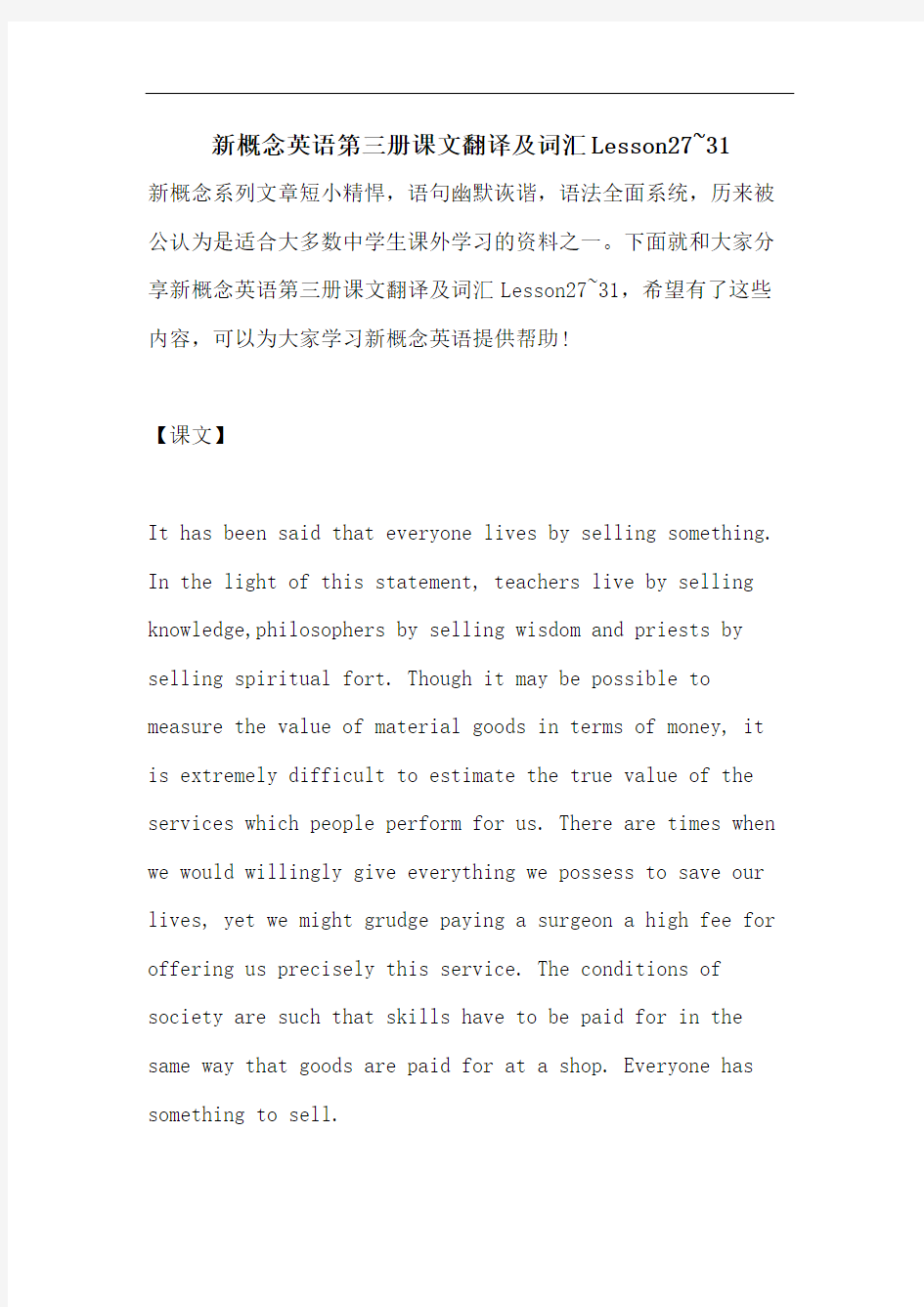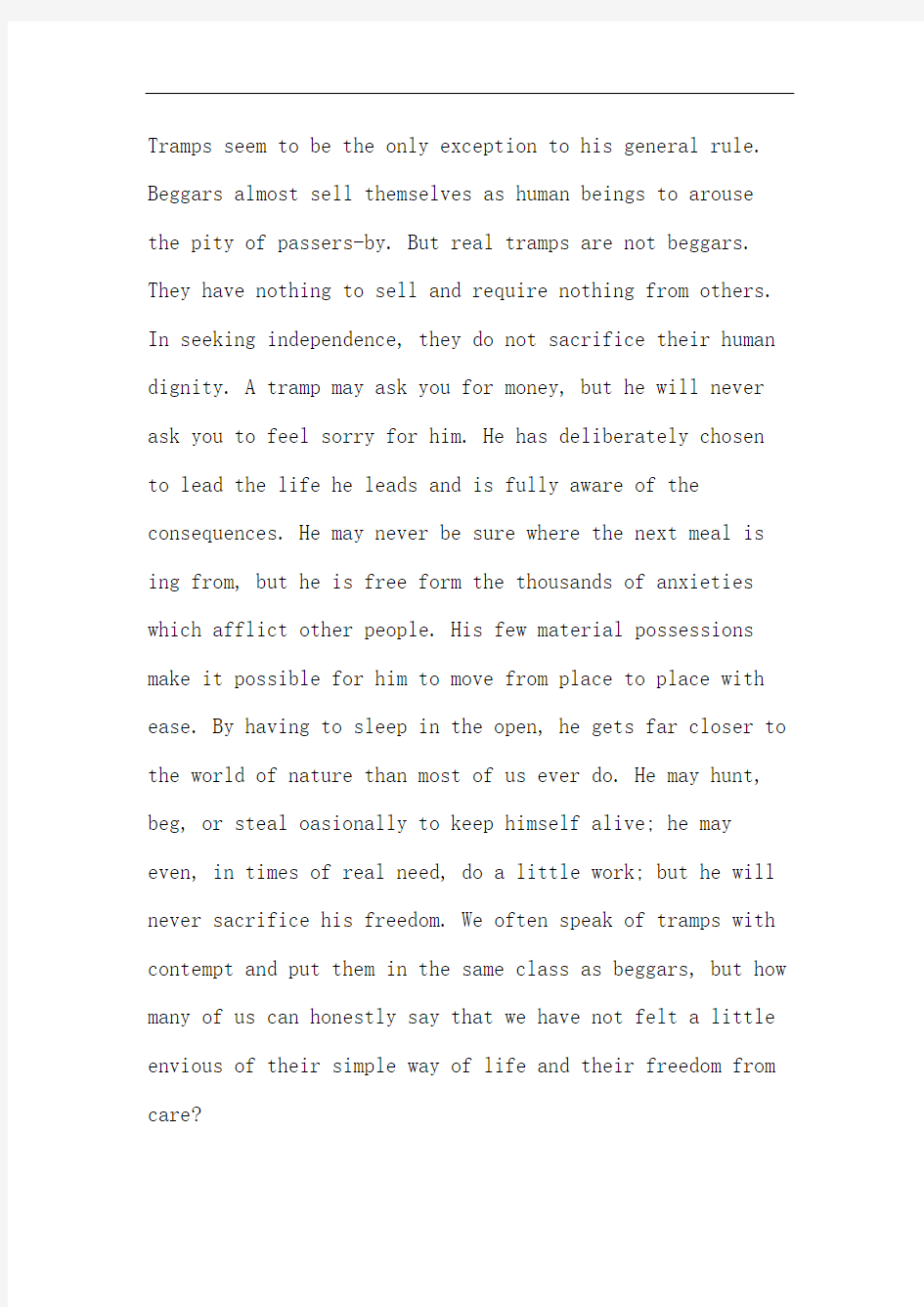

新概念英语第三册课文翻译及词汇Lesson27~31
新概念系列文章短小精悍,语句幽默诙谐,语法全面系统,历来被公认为是适合大多数中学生课外学习的资料之一。下面就和大家分享新概念英语第三册课文翻译及词汇Lesson27~31,希望有了这些内容,可以为大家学习新概念英语提供帮助!
【课文】
It has been said that everyone lives by selling something. In the light of this statement, teachers live by selling knowledge,philosophers by selling wisdom and priests by selling spiritual fort. Though it may be possible to measure the value of material goods in terms of money, it is extremely difficult to estimate the true value of the services which people perform for us. There are times when we would willingly give everything we possess to save our lives, yet we might grudge paying a surgeon a high fee for offering us precisely this service. The conditions of society are such that skills have to be paid for in the same way that goods are paid for at a shop. Everyone has something to sell.
Tramps seem to be the only exception to his general rule. Beggars almost sell themselves as human beings to arouse the pity of passers-by. But real tramps are not beggars. They have nothing to sell and require nothing from others. In seeking independence, they do not sacrifice their human dignity. A tramp may ask you for money, but he will never ask you to feel sorry for him. He has deliberately chosen to lead the life he leads and is fully aware of the consequences. He may never be sure where the next meal is ing from, but he is free form the thousands of anxieties which afflict other people. His few material possessions make it possible for him to move from place to place with ease. By having to sleep in the open, he gets far closer to the world of nature than most of us ever do. He may hunt, beg, or steal oasionally to keep himself alive; he may even, in times of real need, do a little work; but he will never sacrifice his freedom. We often speak of tramps with contempt and put them in the same class as beggars, but how many of us can honestly say that we have not felt a little envious of their simple way of life and their freedom from care?
【课文翻译】
据说每个人都靠出售某种东西来维持生活。根据这种说法,教师靠卖知识为生,哲学家靠卖智慧为生,牧师靠卖精神安慰为生。虽然物质产品的价值可以用金钱来衡量,但要估算别人为我们为所提供的服务的价值却是极其困难的。有时,我们为了挽救生命,愿意付出我们所占有的一切。但就在外科大夫给我们提供了这种服务后,我们却可能为所支付的昂贵的费用而抱怨。社会上的情况就是如此,技术是必须付钱去买的,就像在商店里要花钱买商品一样。人人都有东西可以出售。
在这条普遍的规律前面,好像只有流浪汉是个例外,乞丐出售的几乎是他本人,以引起过路人的怜悯。但真正的流浪并不是乞丐。他们既不出售任何东西,也不需要从别人那儿得到任何东西,在追求独立自由的同时,他们并不牺牲为人的尊严。游浪汉可能会向你讨钱,但他从来不要你可怜他。他是故意在选择过那种生活的,并完全清楚以这种方式生活的后果。他可能从不知道下顿饭有无着落,但他不像有人那样被千万桩愁事所折磨。他几乎没有什么财产,这使他能够轻松自如地在各地奔波。由于被迫在露天睡觉,他比我们中许多人都离大自然近得多。为了生存,他可能会去打猎、乞讨,偶尔偷上一两回;确实需要的时候,他甚至可能干一点儿活,但他决不会牺牲自由。说起流浪汉,我们常常带有轻蔑并把他们与乞丐归
为一类。但是,我们中有多少人能够坦率地说我们对流浪汉的简朴生活与无忧无虑的境况不感到有些羡慕呢?
【生词和短语】
philosopher n. 哲学家
wisdom n. 智慧
priest n. 牧师
spiritual adj. 精神上的
grudge v. 不愿给
surgeon n. 外科大夫
passer(s)-by n. 过路人
dignity n. 尊严
deliberately adv. 故意地
consequence n. 后果
afflict v. 使精神苦恼
ease n. 容易
nature n. 自然,本质
contempt n. 蔑视
envious adj. 嫉妒的
【课文】
Small boats loaded with wares sped to the great liner as she was entering the harbour. Before she had anchored, the men from the boats had climbed on board and the decks were soon covered with colourful rugs form Persia, silks from India, copper coffee pots, and beautiful handmade silverware. It was difficult not to be tempted. Many of the
tourists on board had begun bargaining with the tradesmen, but I decided not to buy anything until I had disembarded.
I had no sooner got off the ship than I was assailed by a man who wanted to sell me a diamond ring. I had no
intention of buying one, but I could not conceal the fact that I was impressed by the size of the diamonds. Some of them were as big as marbles. The man went to great lengths to prove that the diamonds were real. As we were walking past a shop, he held a diamond firmly against the window and made a deep impression in the glass. It took me over half an hour to get rid of him.
The next man to approach me was selling expensive pens and watches. I examined one of the pens closely. It certainly looked genuine. At the base of the gold cap, the words
‘made in the U.S.A.’had been neatly inscribed. The man said that the pen was worth £50, but as a special favour, he would let me have it for £30. I shook my head and held up five fingers indicating that I was willing to pay £5. Gesticulating wildly, the man acted as if he found my offer outrageous, but he eventually reduced the price to £10.
shrugging my shoulders, I began to walk away when, a moment later, he ran after me and thrust the pen into my hands. Though he kept throwing up his arms in despair, he readily aepted the £5 I gave him. I felt especially pleased with my wonderful bargain — until I got back to the ship. No matter how hard I tried, it was impossible to fill this beautiful pen with ink and to this day it has never written a single word!
【课文翻译】
当一艘大型班船进港的时候,许多小船载着各种杂货快速向客轮驶来。大船还未下锚。小船上的人就纷纷爬上客轮。一会儿工夫,甲板上就摆满了色彩斑斓的波斯地毯。印度丝绸。铜咖啡壶以及手工制作的漂亮的银器。要想不为这些东西所动心是很困难的。船上许多游客开始同商贩讨价还价起来,但我打定主意上岸之前什么也不买。
我刚下船,就被一个人截住,他向我兜售一枚钻石戒指。我根本不想买,但我不能掩饰这样一个事实:其钻石之大给我留下了深刻的印象。有的钻石像玻璃球那么大。那人竭力想证明那钻石是真货。
我们路过一家商店时,他将一颗钻石使劲地往橱窗上一按,在玻璃上留下一道深痕。我花了半个多小时才摆脱了他的纠缠。
向我兜售的第二个人是卖名贵钢笔和手表的。我仔细察看了一枝钢笔,那看上去确实不假,金笔帽下方整齐地刻有“美国制造”字样。那人说那支笔值 50英镑,作为特别优惠,他愿意让我出30英镑成交。我摇摇头,伸出 5根手指表示我只愿出 5镑钱。那人激动地打着手势,仿佛我的出价使他不能容忍。但他终于把价钱降到了10英镑。我耸耸肩膀掉头走开了。一会儿,他突然从后追了上来,把笔塞到我手里。虽然他绝望地举起双手,但他毫不迟疑地收下了我付给他的 5镑钱。在回到船上之前,我一直为我的绝妙的讨价还价而洋洋得意。然而不管我如何摆弄,那枝漂亮的钢笔就是吸不进墨水来。直到今天,那枝笔连一个字也没写过!
【生词和短语】
wares n. 货物,商品
anchor v. 停航下锚
deck n. 甲板